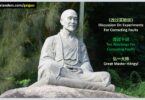如何脱离诸苦
[22] How [To Be] Liberated [From] All Suffering
《阿弥陀经》云:「从是西方,过十万亿佛土,有世界名曰极乐。其土有佛,号阿弥陀,今现在说法。」又曰:「彼土何故名为极乐?其国众生,无有众苦,但受诸乐,故名极乐。」其「无有众苦,但受诸乐」者,由阿弥陀佛福德智慧,神通道力,所庄严故。
[The] Amitā[bha] Sūtra says, ‘From here, [in the] western direction, passing [a] hundred thousand koṭis [of] Buddha lands, is [a] world named “Ultimate Bliss”. [In] that land, is [a] Buddha named “Amitā”, now presently speaking [the] Dharma.’ Also saying, ‘That land [for] what reason, [is] named as “Ultimate Bliss”? [As] that land’s sentient beings, [do] not have all [kinds of] suffering, [and] only receive all [kinds of] bliss, [it is] thus named “Ultimate Bliss”.’ That ‘[do] not have all [kinds of] suffering, [and] only receive all [kinds of] bliss’, [is] due [to] Amitā[bha] Buddha’s [i.e. Āmítuófó (阿弥陀佛)] blessed virtues, wisdom [and] supernormal path’s powers, [by] those adorned thus.
吾人所居之世界,则具足三苦、八苦、无量诸苦,了无有乐,故名娑婆。梵语娑婆,此云堪忍。谓其中众生,堪能忍受此诸苦故。
This world that we reside [in, is] then complete [with] three sufferings, eight sufferings, all immeasurable sufferings, completely not having joys, thus named [as] ‘Sahā’. [In the] Sanskrit language, [on] ‘Sahā’, this [is] said [to be] ‘able [to have] endurance’. Speaking [of] sentient beings within it, [they are] able [to] endure receiving [of] all these sufferings thus.
然此世界,非无有乐。以所有乐事,多皆是苦。众生迷昧,反以为乐。如嗜酒耽色,畋猎摴蒱等,何尝是乐?一班愚夫,耽着不舍,乐以忘疲,诚堪怜愍。
However, this world [is] not without having joys. With all joyful matters, all mostly are sufferings. Sentient beings [are with] confusions [and] ignorance, instead with [them] as joys. Like [being] addicted [to] alcohol [and] indulging [in] sex, hunting [and] dicing [i.e. gambling], how are these really joys? Generally, fools indulging [and] attached [are] reluctant [to] part [from them, with] joys in order to forget weariness, [they] truly can [be] sympathised [with].
即属真乐,亦难长久。如父母俱存,兄弟无故,此事何能常恒?故乐境一过,悲心续起。则谓了无有乐,非过论也。此世界苦,说不能尽,以三苦、八苦,包括无遗。
Even if belonging [to] true joy, [it is] also difficult [to be] long-lasting. If [with] father [and] mother both surviving, brothers [and sisters] without accidents, how [are] these matters able [to] always [be] constant? Thus [with] joyful states once passed, sorrowful minds continue [to] arise. Then saying ‘completely not having joys’, [is] not exaggeration. This world’s sufferings, [with] speaking, [are] not able [to be] exhausted, with three sufferings, eight sufferings, including [them] without omission.
[Note 1: Three Sufferings (三苦):
(1) Suffering From Suffering (苦苦):
(i) Suffering From Birth (生苦)
(ii) Suffering From Ageing (老苦)
(iii) Suffering From Sickness (病苦)
(iv) Suffering From Death (死苦)
(v) Suffering From Meeting The Hated (怨憎会苦)
(2) Suffering From Impermanence (坏苦):
(vi) Suffering From Not Attaining The Sought (求不得苦)
(vii) Suffering Of Departure From The Beloved (爱别离苦)
(3) Suffering From Actions (行苦):
(viii) Suffering From The Five Aggregates* Blazing (Burning Vigorously)** (五蕴炽盛苦)]
[Note 2: On the above, the Eight Sufferings (八苦) are (i) to (viii), with (i) to (iv) being Physical Sufferings (身苦) and (v) to (viii) being Mental Sufferings (心苦).]
[Note 3: Five Aggregates (五蕴):*
(a) Form*** (色)
(b) Feelings (受)
(c) Perceptions (想)
(d) Mental Formations (行)
(e) Consciousness (识)
** The (viii) eighth suffering is all-pervasive subtle suffering through the Five Aggregates, that arises all the time in the background and/or foreground of experience, due to unskilful reaction to all conditioned phenomena, with such ‘blazing’ or being harmed fuelled by the Three Poisons (三毒: attachment [贪], aversion [瞋] and delusion [痴]). Attachment and aversion are caused by delusional thinking of impermanent (无常) and unsubstantial (无我) mind and matter as permanent and substantial, not realising them to be empty (空) in nature.
*** The first aggregate is of matter (身), of the Four Great Elements (四大) of earth, water, fire and wind (地水火风), with the other four aggregates of the mind (心).]
三苦者:一、苦是苦苦,二、乐是坏苦,三、不苦不乐是行苦。
Those three sufferings [are], first, suffering [that] is suffering [from] suffering. Second, joy [that] is suffering [from] impermanence. Third, not suffering [and] not joy is suffering [from] actions.
苦苦者,谓此五阴身心,体性逼迫,故名为苦。又加以恒受生老病死等苦,故名苦苦。
That suffering [from] suffering, [is] called these five aggregates’ body [and] mind, [with their] essential nature forced [and] compelled, thus named as suffering. Also, in addition, with constant receiving [of] birth, ageing, sickness, death [and other] kinds [of] sufferings, thus named [as] suffering [from] suffering.
坏苦者,世间何事,能得久长?日中则昃,月盈则食。天道尚然,何况人事?乐境甫现,苦境即临。当乐境坏灭之时,其苦有不堪言者,故名乐为坏苦也。
[On] that suffering [from] impermanence, [this] world [has] what matter, able to have [that] long-lasting? [The] sun [at] noon then declines, [and the] moon [when] full [is] then ‘eaten’. [If] nature’s path [is] also thus, moreover human matters? [When a] joy[ful] state begins [to] appear, suffering’s state immediately approaches. When that joyful state [is] destroyed [and] eliminated, such suffering is that [which] cannot [be] spoken [of], thus naming [such] joy as suffering [from] impermanence.
行苦者,虽不苦不乐,似乎适宜。而其性迁流,何能常住?故名之为行苦也。举此三苦,无苦不摄。八苦之义,书中备述。
That suffering [from] actions, although [is] not suffering [and] not joyful, [is] seemingly appropriate. Yet [with] its nature moving [and] flowing, how [is it] able [to] constantly abide? Thus naming it as suffering [from] actions. Raising these three sufferings, [they are] without sufferingw not gathered. [The] meanings of [the] eight sufferings, [are] within [this] book detailedly stated.
若知此界之苦,则厌离娑婆之心,自油然而生。若知彼界之乐,则欣求极乐之念,必勃然而起。由是诸恶莫作,众善奉行,以培其基址。
If knowing [the] sufferings of this world, then [the] mind of revulsed renunciation [of this] Sahā [World, will] naturally then arise. If knowing [the] bliss of that land, then [the] thought of joyful seeking [of that Land Of] Ultimate Bliss], will vigorously then arise. Due [to] this, [of] all evils not do, [and of] all good practise, with [these] cultivating its foundation.
再加以至诚恳切,持佛名号,求生西方。则可出此娑婆,生彼极乐,为弥陀之真子,作海会之良朋矣。
In addition, with earnestness [and] utmost sincerity, uphold [the] Buddha’s name [i.e. Āmítuófó (阿弥陀佛)], [for] seeking birth [in his] Western [Pure Land Of Ultimate Bliss] [西方极乐世界]. Then can [there be] exit [from] this Sahā [World, to be] born [in] that Ultimate Bliss, [to] become true disciples of [Ā]mítuó[fó, and] become good friends of [the] ocean-wide assembly.
净土宗十三祖印光大师
Pure Land Tradition’s 13th Patriarch Great Master Yìnguāng
《印光法师文钞》(正编):初机净业指南序;
Dharma Master Yìnguāng’s Collected Writings (First Compilation): Beginners’ Pure Karmas’ Guide’s Preface;
印光大师文钞菁华录(第二十二则):二、诫信愿真切:甲、示真信切愿(第四则)Record [Of] Great Master Yìnguāng’s Collected Writings’ Essence (22nd Short Section): 2nd [Chapter]: Admonishment [For] Faith [And] Aspiration [To Be] True [And] Sincere: First, Guidance [On] True Faith [And] Sincere Aspiration (4th Short Section)
[Ref: #22 / 2.1.4]
Namo Amituofo : Translation and notes by Shen Shi’an
下一部分
Next Part:
以特别法门,现生得实益
[23] With The Special Dharma Door, In This Present Life Attain True Benefits
https://purelanders.com/2025/05/15/23-with-the-special-dharma-door-in-this-present-life-attain-true-benefits
上一部分
Previous Part:
三资粮与三力圆融法
[21] How The Three Provisions Interpenetrate With The Three Powers
https://purelanders.com/2025/03/04/how-three-provisions-interpenetrate-with-three-powers
完整典籍
Complete Text:
《印光大师文钞菁华录》
Record Of Great Master Yìnguāng’s Collected Writings’ Essence
https://purelanders.com/jinghualu





